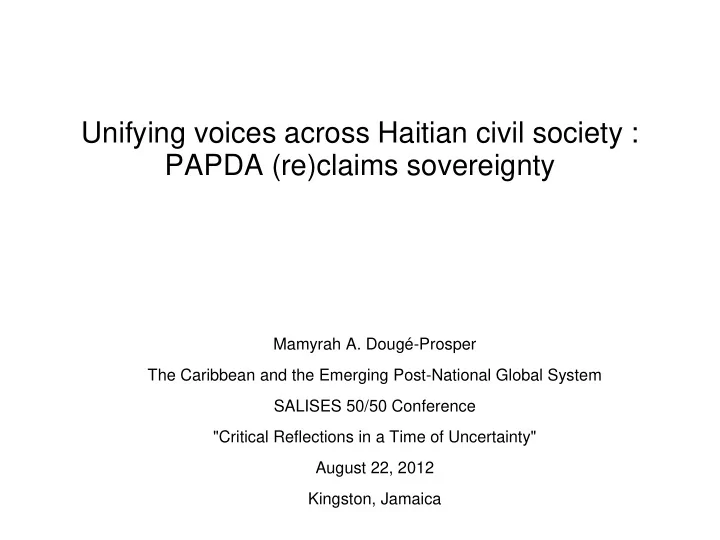

Unifying voices across Haitian civil society : PAPDA (re)claims sovereignty Mamyrah A. Dougé-Prosper The Caribbean and the Emerging Post-National Global System SALISES 50/50 Conference "Critical Reflections in a Time of Uncertainty" August 22, 2012 Kingston, Jamaica
• On January 12, 2010, a 7.0 earthquake devastated parts of the Haitian cities of Port-au-Prince, and neighboring towns and communities. • A few hours after the disaster, the former administration of René Préval welcomed- even before aid had been delivered: o the U.S. Military, o additional United Nations peacekeeping troops o and thousands more international non- governmental organizations.
• On November 18, 2011, a transnational network of unions, student groups, feminist organizations, and other movements from Haiti, the U.S., France, Martinique, Guadeloupe, Trinidad, and Dominica gathered in Vertieres to demand the removal of the United Nations troops. • With the support of the international, the Haitian Popular Movement, through the coordination of PAPDA , called for a re-definition of sovereignty and citizenship through a proposal of an alternative ordering of the nation-state .
The (post)colonial nation-state • Nation is traditionally imagined as homogenous and territorially bound (Anderson 1991) • However, transnational, feminist and critical theorists highlight : o the uneven elite-led hetero-masculinist bourgeois project that is the postcolonial nation (Barraclough 1993, Chatterjee 2003) o the de-territorialization and re-territorialization of the postcolonial nation to include its Diaspora (Laguerre 1998)
• State makes nations logistically (Agnew 2009, Mitchell 1999) • This project seeks to de-lodge the state as the sole interlocutor of the international and to instead emphasize the power of local actors in shaping the postcolonial nation- state
Re-positioning the State • The State o Procedures, structures, institutions, policies • Graduated sovereignty (Ong 1999) o The state is not a commanding center (Agnew 2009) o Circulation of power by a various actors at varying sites o Effective sovereignty is not based on fixed territorial limits
The Diaspora : Nationality versus Citizenship • The nation includes the Diaspora (11 th Department) • Up until this past June, the state had refused to grant extra-territorial rights to diasporic members • Nationality and Citizenship were disentangled (Labelle 1999) • Haitian identity is fluid and multifaceted (Glick- Schiller and Fouron 1990)
A transnational capitalist class : The Diaspora differentiated • Dual citizenship opposed o President Joseph Michel Martelly scandal • Transgression of capital, goods, resources, and humans across geographical borders o « Flexible » citizens
Purpose of Study • Plateforme Haitienne de Plaidoyer pour un Développement Alternatif (PAPDA) o www.papda.org o Non-profit organization o Founded in 1995 o Marxist/Feminist rhetoric o Democratic participatory process
Selected Research Questions • How are the state and civil society being re-shaped by the ongoing anti-Occupation campaign? • How does PAPDA frame sovereignty within this transnational activist campaign? • • How are race, class, gender, and sexuality deployed in PAPDA ’s proposed alternative to the current configuration of the Haitian nation-state?
Social movements : Identity Politics and the International • Identity Politics (Hale 1997) o Shift from discourse on class-based to identity- based struggles/issues o « Old » versus « new » movements • The International o Kinship Politics (Patil 2008)
The Republic of NGOs • International support (Viatori 2007) o Visibility, legitimacy, authenticity o Hiearchically differentiated transnational and local social movements o Control of framing narratives
Methodologies • « Situated Knowledges » (Harraway 1988) • Purposive snowball sampling o Take Back the Land • Participatory Action Research (Hickey and Mohan 2005) o Semi-structured interviews o Digital and at times video recording o Participant Observation
Analysis • Critical Discourse Analysis (CDA) o De-mystification of power and ideology o Meaning and social relations are produced through language o Reproduction of power through discourse o Concerned with all forms of social inequality and injustice • Visual anthropology (Pink 2006)
Contributions • Complements work on race, class, gender, and sexuality in the postcolonial nation-state • Pushes forward by emphasizing spatial dimensions : o The Diaspora • Situates the under-reported and under-theorized Haitian Popular Movement
THANK YOU QUESTIONS ?
Recommend
More recommend